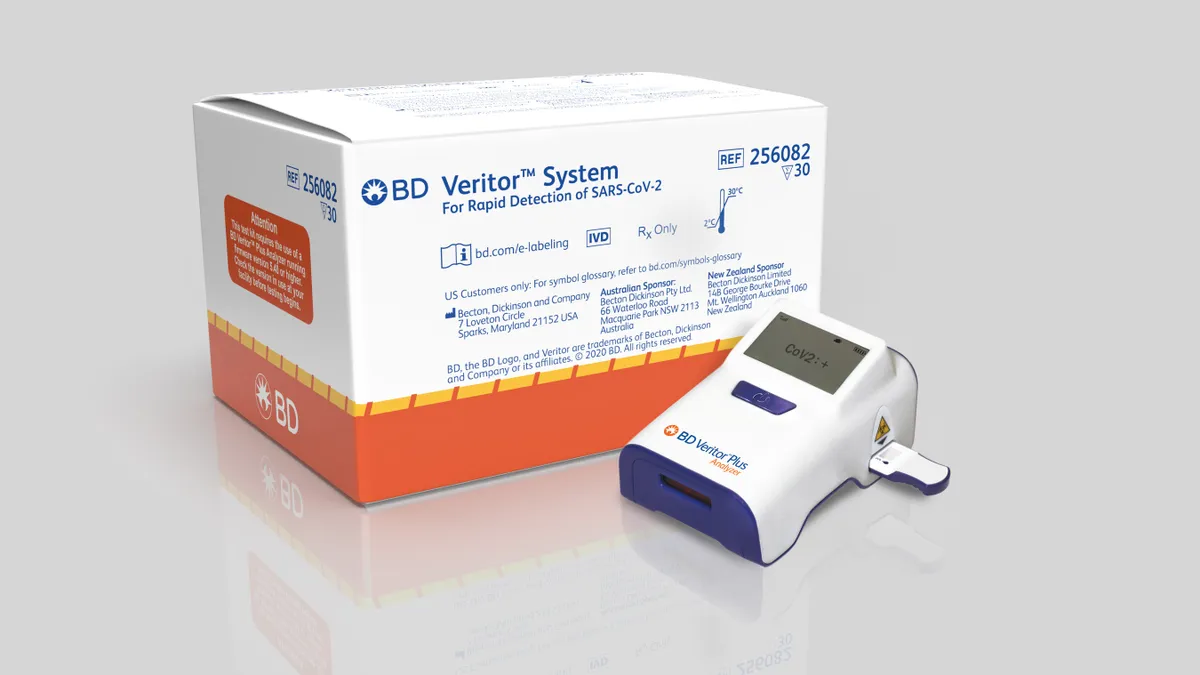Dive Brief:
- Becton Dickinson on Tuesday doubled down on the company's COVID-19 testing guidance for the rest of the year, despite Abbott last week lowering its 2021 outlook due to a sharp and rapid decline in demand for coronavirus-related tests.
- CEO Tom Polen told investors at the Goldman Sachs healthcare conference that BD stands by its original 2021 forecast of $1.8 billion to $1.9 billion in revenue for COVID-19 diagnostics. "That remains completely unchanged," Polen said, noting that at the beginning of the year the company announced it expected revenue for its Veritor rapid antigen test towards the upper end of previously provided $1 billion to $1.5 billion guidance. "We ended up saying we expect to be at the high end of that. Let's call that around $1.4 billion or so."
- Abbott Laboratories CEO Robert Ford last week called out recent "unexpected" changes in guidance from the Centers for Disease Control and Prevention on testing for fully vaccinated individuals as a contributing factor in May's "sudden" drop-off in demand for COVID-19 testing, particularly for rapid tests. BD's Polen on Tuesday said regardless of what "our competitors" indicate or the CDC has announced "that doesn't change at all our outlook for the year."
Dive Insight:
Coronavirus-related sales at other diagnostic companies such as Abbott and Quidel have fallen short of analyst expectations in recent financial updates. However, Abbott's bombshell announcement last week and updated outlook reflects a changing testing landscape as COVID-19 cases have continued to drop significantly since mid-April with the increase in vaccinations across the U.S. and other parts of the world.
Despite Polen's confidence, last month the company reported COVID-19 diagnostics underperformed in its fiscal second quarter. Test revenues totaled $480 million, with BD's Veritor Plus rapid antigen test bringing in $290 million. However, it was far below Evercore ISI analyst expectations of $550 million and SVB Leerink estimates of $587 million, respectively.
Pressed by a Goldman Sachs analyst on Tuesday about the volatile COVID-19 test market, Polen reiterated that going into 2021 BD knew that the availability of vaccines early in the year would result in an increase in testing in the first and second quarters and then significantly drop off in the back half of the year.
"That's what we communicated from the start. That's what we budgeted. That's what we planned for and that's exactly how it's come to be," Polen told investors, adding that BD has been "very cautious " in how much inventory the company built "because we viewed that [the demand] would be coming down."
Polen also noted that BD has accelerated the depreciation of any COVID-19 diagnostic capacity assets.
"You would normally depreciate capital assets over, call it, an eight-year period. We did it in this year right from the start, so we don't have any write-off coming on those type of capital investment," the CEO said.
Other diagnostics companies have made significant investments in coronavirus-related infrastructure.
Abbott last year spent hundreds of millions of dollars to build two manufacturing plants to support COVID-19 test production. Quidel in February opened a new manufacturing facility in Carlsbad, California, which is slated to begin operations in the second half of 2021 with plans to produce 600 million QuickVue SARS rapid antigen tests per year.
However, Quidel in March lowered 2021 revenue guidance from $2.9 billion to roughly $2.5 billion, as the company has had to adjust for the drop-off in COVID-19 testing demand in the first quarter.
Abbott now forecasts about $4 billion to $4.5 billion in COVID-19 testing sales in 2021, including second-quarter sales of around $1.1 billion. The company previously forecasted about $6.5 billion to $7 billion in coronavirus test sales on its fourth-quarter earnings call in late January.













